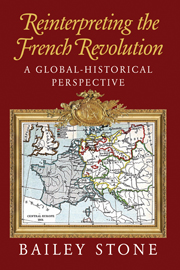Book contents
- Frontmatter
- Contents
- Acknowledgments
- Introduction
- 1 The ancien régime: challenges not met, a dilemma not overcome
- 2 The descent into revolution: from August 1788 to October 1789
- 3 The first attempt to stabilize the Revolution: from 1789 to 1791
- 4 The “revolutionizing” of the Revolution: from 1791 to 1794
- 5 The second attempt to stabilize the revolution: from 1794 to 1799
- Conclusion: the Revolution in the French and global context
- Suggestions for further reading
- Index
Conclusion: the Revolution in the French and global context
Published online by Cambridge University Press: 02 December 2009
- Frontmatter
- Contents
- Acknowledgments
- Introduction
- 1 The ancien régime: challenges not met, a dilemma not overcome
- 2 The descent into revolution: from August 1788 to October 1789
- 3 The first attempt to stabilize the Revolution: from 1789 to 1791
- 4 The “revolutionizing” of the Revolution: from 1791 to 1794
- 5 The second attempt to stabilize the revolution: from 1794 to 1799
- Conclusion: the Revolution in the French and global context
- Suggestions for further reading
- Index
Summary
The French Revolution, one scholar has recently concluded, was a “decisive historical rupture” that placed Louis XVI and his eventual successor, Napoleon I, in “totally different spheres.” To adopt this view is to disagree in some measure with those writers, from Alexis de Tocqueville to Georges Lefebvre to François Furet, who over the years have accentuated continuities undergirding historical developments in prerevolutionary, revolutionary, and postrevolutionary France. In completing what we have defined in these pages as a “global-historical” analysis of the upheavals of 1789–99, we may find it possible to accommodate both of these explanatory tendencies. In doing so, however, we shall probably have to conclude that most historians of the Revolution, whether they stress themes of discontinuity or themes of continuity in their work, have failed to situate the drama of 1789–99 in its larger, international/domestic context. This will become increasingly clear in this Conclusion as we do essentially two things: (1) reassess the Revolution against the broad backdrop of early-modern and modern French history; and (2) situate it within a world-historical context of modern sociopolitical upheavals.
On the first point, if there is anything that we have learned from our phase-by-phase analysis of the French Revolution, it is that the men dictating French destinies in this period were driven in their politics and policy-making by a “dialectic” of foreign and domestic concerns. To say this, however, is not to cite something in the French experience that was unique to the revolutionary era.
- Type
- Chapter
- Information
- Reinterpreting the French RevolutionA Global-Historical Perspective, pp. 259 - 268Publisher: Cambridge University PressPrint publication year: 2002



